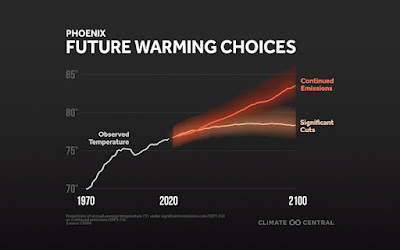Climate change is already here in many US communities | "Heat Officers" versus Climate Change Officers
The Guardian has a chilling story, "A third of Americans are already facing above-average warming," about how many US counties (and the cities within) already are experiencing a warming of at least 1.5℃.
Almost 200 people died from extreme heat in Phoenix in 2020 – the hottest, driest and deadliest summer on record with 53 days topping 110F (43C) compared with a previous high of 33 days. Last year there were fewer scorching days, but the death toll remained staggeringly high, with people experiencing homelessness and addictions dying disproportionately....Last year, after another deadly summer, the mayor announced the region’s first dedicated unit to tackle the growing hazard of urban heat, which also threatens the city’s economic viability. ...
Hondula recently submitted the 2022 heat response plan to city hall, in an attempt to coordinate the existing patchwork of services. “I’m impressed by the number of programs but the death and illness numbers are moving in the wrong direction, so there’s a disconnect we need to address,” he said. “If we mean to take a hazard seriously, relying on good fortune, luck and happenstance is not the best model.”
Mitigation will be focused on trees and infrastructure, which will be led by an urban forester and a built environment expert who are yet to be hired.
When there was a water shortage, Mockus appeared on TV programs taking a shower and turning off the water as he soaped, asking his fellow citizens to do the same. In just two months people were using 14 percent less water, a savings that increased when people realized how much money they were also saving because of economic incentives approved by Mockus; water use is now 40 percent less than before the shortage.
Labels: emergency management planning, global warming-climate change-drought, green-environment-urban, resilience, sustainable land use and resource planning, water supply and use, weather






0 Comments:
Post a Comment
<< Home